
ai-tech-interview
👩💻👨💻 AI 엔지니어 기술 면접 스터디 (⭐️ 1k+)
Stars: 1829
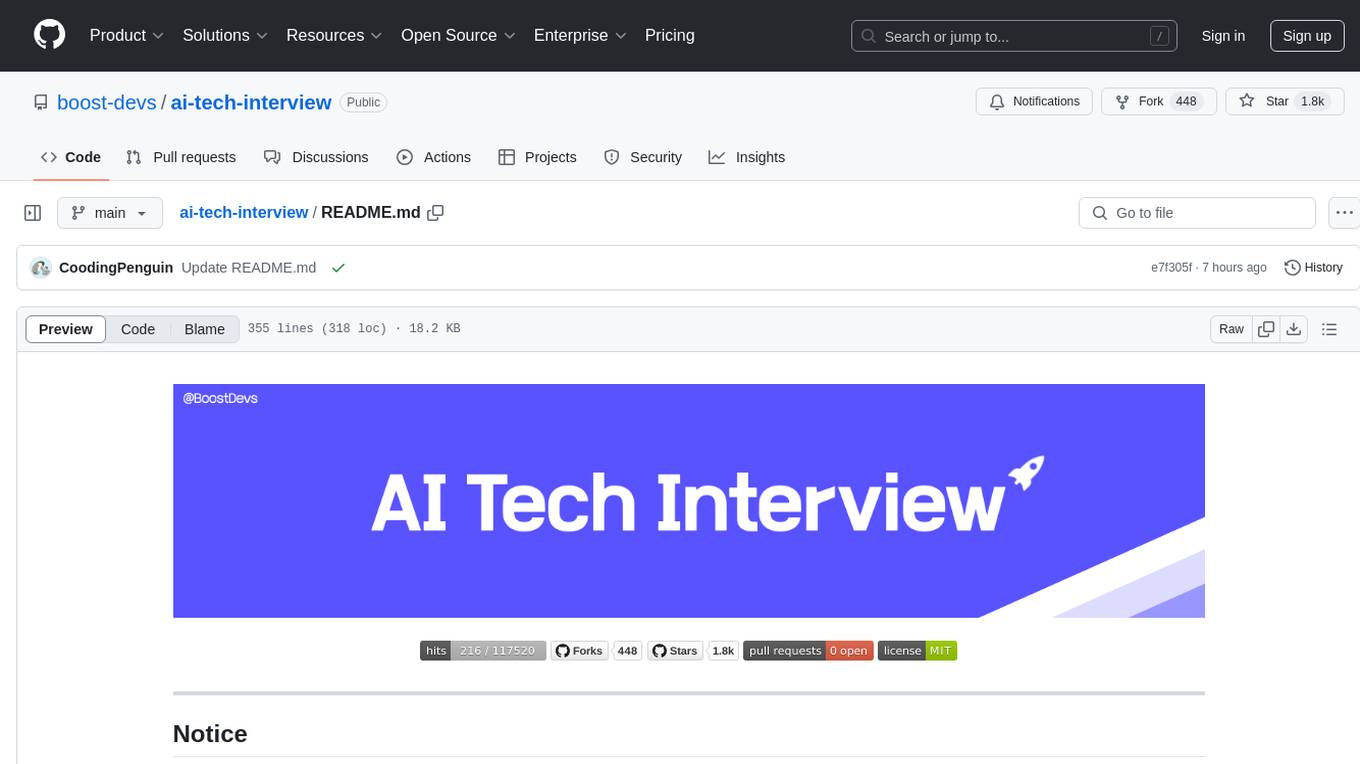
This repository contains a collection of interview questions related to various topics such as statistics, machine learning, deep learning, Python, networking, operating systems, data structures, and algorithms. The questions cover a wide range of concepts and are suitable for individuals preparing for technical interviews in the field of artificial intelligence and data science.
README:
[!WARNING]
PR 요청 시 작성 규칙을 준수해주세요. 준수하지 않을 시 해당 PR은 거절될 수 있습니다.
- 피드백은 Pull Request를 통한 피드백 요청 방법을 참고하여 Pull Request로 보내주세요.
- Pull Request 작성 규칙은 여기를 참고해주세요.
- GitHub 외에 GitBook 사이트로도 보실 수 있습니다.
-
하지만 Latex 문법이 달라 다른 웹사이트로 마이그레이션 예정입니다.시간될 때 마이그레이션 예정입니다..🥲
-
- 궁금한 점이 있거나 공유하고 싶은 팁이 있으시면 Discussion을 활용해주세요.
- 커뮤니티 활성화는 언제든지 환영입니다!
- 면접 레포 개선 프로젝트 진행 상황은 여기를 확인해주세요.
- 공지에서 말씀드린 것처럼 진행이 더딜 수 있습니다.
📈 통계/수학
- 고유값(eigen value)와 고유벡터(eigen vector)이 무엇이고 왜 중요한지 설명해주세요.
- 샘플링(Sampling)과 리샘플링(Resampling)이 무엇이고 리샘플링의 장점을 말씀해주세요.
- 확률 모형과 확률 변수는 무엇인가요?
- 누적 분포 함수와 확률 밀도 함수는 무엇인가요? 수식과 함께 표현해주세요.
- 조건부 확률은 무엇인가요?
- 공분산과 상관계수는 무엇일까요? 수식과 함께 표현해주세요.
- 신뢰 구간의 정의는 무엇인가요?
- p-value를 모르는 사람에게 설명한다면 어떻게 설명하실 건가요?
- R square의 의미는 무엇인가요?
- 평균(mean)과 중앙값(median)중에 어떤 케이스에서 뭐를 써야할까요?
- 중심극한정리는 왜 유용한걸까요?
- 엔트로피(entropy)에 대해 설명해주세요. 가능하면 Information Gain도요.
- 어떨 때 모수적 방법론을 쓸 수 있고, 어떨 때 비모수적 방법론을 쓸 수 있나요?
- “likelihood”와 “probability”의 차이는 무엇일까요?
- 통계에서 사용되는 bootstrap의 의미는 무엇인가요.
- 모수가 매우 적은 (수십개 이하) 케이스의 경우 어떤 방식으로 예측 모델을 수립할 수 있을까요?
- 베이지안과 프리퀀티스트 간의 입장차이를 설명해주실 수 있나요?
- 검정력(statistical power)은 무엇일까요?
- missing value가 있을 경우 채워야 할까요? 그 이유는 무엇인가요?
- 아웃라이어의 판단하는 기준은 무엇인가요?
- 필요한 표본의 크기를 어떻게 계산합니까?
- Bias를 통제하는 방법은 무엇입니까?
- 로그 함수는 어떤 경우 유용합니까? 사례를 들어 설명해주세요.
- 베르누이 분포 / 이항 분포 / 카테고리 분포 / 다항 분포 / 가우시안 정규 분포 / t 분포 / 카이제곱 분포 / F 분포 / 베타 분포 / 감마 분포에 대해 설명해주세요. 그리고 분포 간의 연관성도 설명해주세요.
- 출장을 위해 비행기를 타려고 합니다. 당신은 우산을 가져가야 하는지 알고 싶어 출장지에 사는 친구 3명에게 무작위로 전화를 하고 비가 오는 경우를 독립적으로 질문해주세요. 각 친구는 2/3로 진실을 말하고 1/3으로 거짓을 말합니다. 3명의 친구가 모두 “그렇습니다. 비가 내리고 있습니다”라고 말했습니다. 실제로 비가 내릴 확률은 얼마입니까?
🤖 머신러닝
- 알고 있는 metric에 대해 설명해주세요. (ex. RMSE, MAE, recall, precision ...)
- 정규화를 왜 해야할까요? 정규화의 방법은 무엇이 있나요?
- Local Minima와 Global Minimum에 대해 설명해주세요.
- 차원의 저주에 대해 설명해주세요.
- dimension reduction기법으로 보통 어떤 것들이 있나요?
- PCA는 차원 축소 기법이면서, 데이터 압축 기법이기도 하고, 노이즈 제거기법이기도 합니다. 왜 그런지 설명해주실 수 있나요?
- LSA, LDA, SVD 등의 약자들이 어떤 뜻이고 서로 어떤 관계를 가지는지 설명할 수 있나요?
- Markov Chain을 고등학생에게 설명하려면 어떤 방식이 제일 좋을까요?
- 텍스트 더미에서 주제를 추출해야 합니다. 어떤 방식으로 접근해 나가시겠나요?
- SVM은 왜 반대로 차원을 확장시키는 방식으로 동작할까요? SVM은 왜 좋을까요?
- 다른 좋은 머신 러닝 대비, 오래된 기법인 나이브 베이즈(naive bayes)의 장점을 옹호해보세요.
- 회귀 / 분류시 알맞은 metric은 무엇일까?
- Association Rule의 Support, Confidence, Lift에 대해 설명해주세요.
- 최적화 기법중 Newton’s Method와 Gradient Descent 방법에 대해 알고 있나요?
- 머신러닝(machine)적 접근방법과 통계(statistics)적 접근방법의 둘간에 차이에 대한 견해가 있나요?
- 인공신경망(deep learning이전의 전통적인)이 가지는 일반적인 문제점은 무엇일까요?
- 지금 나오고 있는 deep learning 계열의 혁신의 근간은 무엇이라고 생각하시나요?
- ROC 커브에 대해 설명해주실 수 있으신가요?
- 여러분이 서버를 100대 가지고 있습니다. 이때 인공신경망보다 Random Forest를 써야하는 이유는 뭘까요?
- K-means의 대표적 의미론적 단점은 무엇인가요? (계산량 많다는것 말고)
- L1, L2 정규화에 대해 설명해주세요.
- Cross Validation은 무엇이고 어떻게 해야하나요?
- XGBoost을 아시나요? 왜 이 모델이 캐글에서 유명할까요?
- 앙상블 방법엔 어떤 것들이 있나요?
- feature vector란 무엇일까요?
- 좋은 모델의 정의는 무엇일까요?
- 50개의 작은 의사결정 나무는 큰 의사결정 나무보다 괜찮을까요? 왜 그렇게 생각하나요?
- 스팸 필터에 로지스틱 리그레션을 많이 사용하는 이유는 무엇일까요?
- OLS(ordinary least squre) regression의 공식은 무엇인가요?
🧠 딥러닝
- 딥러닝은 무엇인가요? 딥러닝과 머신러닝의 차이는?
- Cost Function과 Activation Function은 무엇인가요?
- Tensorflow, PyTorch 특징과 차이가 뭘까요?
- Data Normalization은 무엇이고 왜 필요한가요?
- 알고있는 Activation Function에 대해 알려주세요. (Sigmoid, ReLU, LeakyReLU, Tanh 등)
- 오버피팅일 경우 어떻게 대처해야 할까요?
- 하이퍼 파라미터는 무엇인가요?
- Weight Initialization 방법에 대해 말해주세요. 그리고 무엇을 많이 사용하나요?
- 볼츠만 머신은 무엇인가요?
- TF, PyTorch 등을 사용할 때 디버깅 노하우는?
- 뉴럴넷의 가장 큰 단점은 무엇인가? 이를 위해 나온 One-Shot Learning은 무엇인가?
- 요즘 Sigmoid 보다 ReLU를 많이 쓰는데 그 이유는?
- Non-Linearity라는 말의 의미와 그 필요성은?
- ReLU로 어떻게 곡선 함수를 근사하나?
- ReLU의 문제점은?
- Bias는 왜 있는걸까?
- Gradient Descent에 대해서 쉽게 설명한다면?
- 왜 꼭 Gradient를 써야 할까? 그 그래프에서 가로축과 세로축 각각은 무엇인가? 실제 상황에서는 그 그래프가 어떻게 그려질까?
- GD 중에 때때로 Loss가 증가하는 이유는?
- Back Propagation에 대해서 쉽게 설명 한다면?
- Local Minima 문제에도 불구하고 딥러닝이 잘 되는 이유는?
- GD가 Local Minima 문제를 피하는 방법은?
- 찾은 해가 Global Minimum인지 아닌지 알 수 있는 방법은?
- Training 세트와 Test 세트를 분리하는 이유는?
- Validation 세트가 따로 있는 이유는?
- Test 세트가 오염되었다는 말의 뜻은?
- Regularization이란 무엇인가?
- Batch Normalization의 효과는?
- Dropout의 효과는?
- BN 적용해서 학습 이후 실제 사용시에 주의할 점은? 코드로는?
- GAN에서 Generator 쪽에도 BN을 적용해도 될까?
- SGD, RMSprop, Adam에 대해서 아는대로 설명한다면?
- SGD에서 Stochastic의 의미는?
- 미니배치를 작게 할때의 장단점은?
- 모멘텀의 수식을 적어 본다면?
- 간단한 MNIST 분류기를 MLP+CPU 버전으로 numpy로 만든다면 몇줄일까?
- 어느 정도 돌아가는 녀석을 작성하기까지 몇시간 정도 걸릴까?
- Back Propagation은 몇줄인가?
- CNN으로 바꾼다면 얼마나 추가될까?
- 간단한 MNIST 분류기를 TF, PyTorch 등으로 작성하는데 몇시간이 필요한가?
- CNN이 아닌 MLP로 해도 잘 될까?
- 마지막 레이어 부분에 대해서 설명 한다면?
- 학습은 BCE loss로 하되 상황을 MSE loss로 보고 싶다면?
- 딥러닝할 때 GPU를 쓰면 좋은 이유는?
- GPU를 두개 다 쓰고 싶다. 방법은?
- 학습시 필요한 GPU 메모리는 어떻게 계산하는가?
🐍 파이썬
- What is the difference between list and tuples in Python?
- What are the key features of Python?
- What type of language is python? Programming or scripting?
- Python an interpreted language. Explain.
- What is pep 8?
- How is memory managed in Python?
- What is namespace in Python?
- What is PYTHONPATH?
- What are python modules? Name some commonly used built-in modules in Python?
- What are local variables and global variables in Python?
- Is python case sensitive?
- What is type conversion in Python?
- How to install Python on Windows and set path variable?
- Is indentation required in python?
- What is the difference between Python Arrays and lists?
- What are functions in Python?
- What is
__init__? - What is a lambda function?
- What is self in Python?
- How does break, continue and pass work?
- What does
[::-1]do? - How can you randomize the items of a list in place in Python?
- What’s the difference between iterator and iterable?
- How can you generate random numbers in Python?
- What is the difference between range & xrange?
- How do you write comments in python?
- What is pickling and unpickling?
- What are the generators in python?
- How will you capitalize the first letter of string?
- How will you convert a string to all lowercase?
- How to comment multiple lines in python?
- What are docstrings in Python?
- What is the purpose of is, not and in operators?
- What is the usage of help() and dir() function in Python?
- Whenever Python exits, why isn’t all the memory de-allocated?
- What is a dictionary in Python?
- How can the ternary operators be used in python?
- What does this mean:
*args,**kwargs? And why would we use it? - What does len() do?
- Explain split(), sub(), subn() methods of “re” module in Python.
- What are negative indexes and why are they used?
- What are Python packages?
- How can files be deleted in Python?
- What are the built-in types of python?
- What advantages do NumPy arrays offer over (nested) Python lists?
- How to add values to a python array?
- How to remove values to a python array?
- Does Python have OOps concepts?
- What is the difference between deep and shallow copy?
- How is Multithreading achieved in Python?
- What is the process of compilation and linking in python?
- What are Python libraries? Name a few of them.
- What is split used for?
- How to import modules in python?
- Explain Inheritance in Python with an example.
- How are classes created in Python?
- What is monkey patching in Python?
- Does python support multiple inheritance?
- What is Polymorphism in Python?
- Define encapsulation in Python?
- How do you do data abstraction in Python?
- Does python make use of access specifiers?
- How to create an empty class in Python?
- What does an object() do?
- What is map function in Python?
- Is python numpy better than lists?
- What is GIL in Python language?
- What makes the CPython different from Python?
- What are Decorators in Python?
- What is object interning?
- What is @classmethod, @staticmethod, @property?
🌐 네트워크
- TCP/IP의 각 계층을 설명해주세요.
- OSI 7계층와 TCP/IP 계층의 차이를 설명해주세요.
- Frame, Packet, Segment, Datagram을 비교해주세요.
- TCP와 UDP의 차이를 설명해주세요.
- TCP와 UDP의 헤더를 비교해주세요.
- TCP의 3-way-handshake와 4-way-handshake를 비교 설명해주세요.
- TCP의 연결 설정 과정(3단계)과 연결 종료 과정(4단계)이 단계가 차이나는 이유가 무엇인가요?
- 만약 Server에서 FIN 플래그를 전송하기 전에 전송한 패킷이 Routing 지연이나 패킷 유실로 인한 재전송 등으로 인해 FIN 패킷보다 늦게 도착하는 상황이 발생하면 어떻게 될까요?
- 초기 Sequence Number인 ISN을 0부터 시작하지 않고 난수를 생성해서 설정하는 이유가 무엇인가요?
- HTTP와 HTTPS에 대해서 설명하고 차이점에 대해 설명해주세요.
- HTTP 요청/응답 헤더의 구조를 설명해주세요.
- HTTP와 HTTPS 동작 과정을 비교해주세요.
- CORS가 무엇인가요?
- HTTP GET과 POST 메서드를 비교/설명해주세요.
- 쿠키(Cookie)와 세션(Session)을 설명해주세요.
- DNS가 무엇인가요?
- REST와 RESTful의 개념을 설명하고 차이를 말해주세요.
- 소켓(Socket)이 무엇인가요? 자신 있는 언어로 간단히 소켓 생성 예시를 보여주세요.
- Socket.io와 WebSocket의 차이를 설명해주세요.
- IPv4와 IPv6 차이를 설명해주세요.
- MAC Address가 무엇인가요?
- 라우터와 스위치, 허브의 차이를 설명해주세요.
- SMTP가 무엇인가요?
- 노트북으로
www.google.com에 접속을 했습니다. 요청을 보내고 받기까지의 과정을 자세히 설명해주세요. - 여러 네트워크 topology에 대해 간단히 소개해주세요.
- subnet mask에 대해서 설명해주세요.
- data encapsulation이 무엇인가요?
- DHCP를 설명해주세요.
- routing protocol을 몇 가지 설명해주세요. (ex. link state, distance vector)
- 이더넷(ethernet)이 무엇인가요?
- client와 server의 차이점을 설명해주세요.
- delay, timing(jitter), throughput 차이를 설명해주세요.
🖥️ 운영체제
- 프로세스와 스레드의 차이(Process vs Thread)를 알려주세요.
- 멀티 프로세스 대신 멀티 스레드를 사용하는 이유를 설명해주세요.
- 캐시의 지역성에 대해 설명해주세요.
- Thread-safe에 대해 설명해주세요. (hint: critical section)
- 뮤텍스와 세마포어의 차이를 설명해주세요.
- 스케줄러가 무엇이고, 단기/중기/장기로 나누는 기준에 대해 설명해주세요.
- CPU 스케줄러인 FCFS, SJF, SRTF, Priority Scheduling, RR에 대해 간략히 설명해주세요.
- 동기와 비동기의 차이를 설명해주세요.
- 메모리 관리 전략에는 무엇이 있는지 간략히 설명해주세요.
- 가상 메모리에 대해 설명해주세요.
- 교착상태(데드락, Deadlock)의 개념과 조건을 설명해주세요.
- 사용자 수준 스레드와 커널 수준 스레드의 차이를 설명해주세요.
- 외부 단편화와 내부 단편화에 대해 설명해주세요.
- Context Switching이 무엇인지 설명하고 과정을 나열해주세요.
- Swapping에 대해 설명해주세요.
🗂 자료구조
- linked list
- single linked list
- double linked list
- circular linked list
- hash table
- stack
- queue
- circular queue
- graph
- tree
- binary tree
- full binary tree
- complete binary tree
- bst(binary search tree)
- heap(binary heap)
- min heap
- max heap
- red-black tree
- b+ tree
🔻 알고리즘
- 시간, 공간 복잡도
- Sort Algorithm
- Bubble Sort
- Selection Sort
- Insertion Sort
- Merge Sort
- Heap Sort
- Quick Sort
- Counting Sort
- Radix Sort
- Divide and Conquer
- Dynamic Programming
- Greedy Algorithm
- Graph
- Graph Traversal: BFS, DFS
- Shortest Path
- Dijkstra
- Floyd-Warshall
- Bellman-Ford
- Minimum Spanning Tree
- Prim
- Kruskal
- Union-find
- Topological sort
For Tasks:
Click tags to check more tools for each tasksFor Jobs:
Alternative AI tools for ai-tech-interview
Similar Open Source Tools

ai-tech-interview
This repository contains a collection of interview questions related to various topics such as statistics, machine learning, deep learning, Python, networking, operating systems, data structures, and algorithms. The questions cover a wide range of concepts and are suitable for individuals preparing for technical interviews in the field of artificial intelligence and data science.
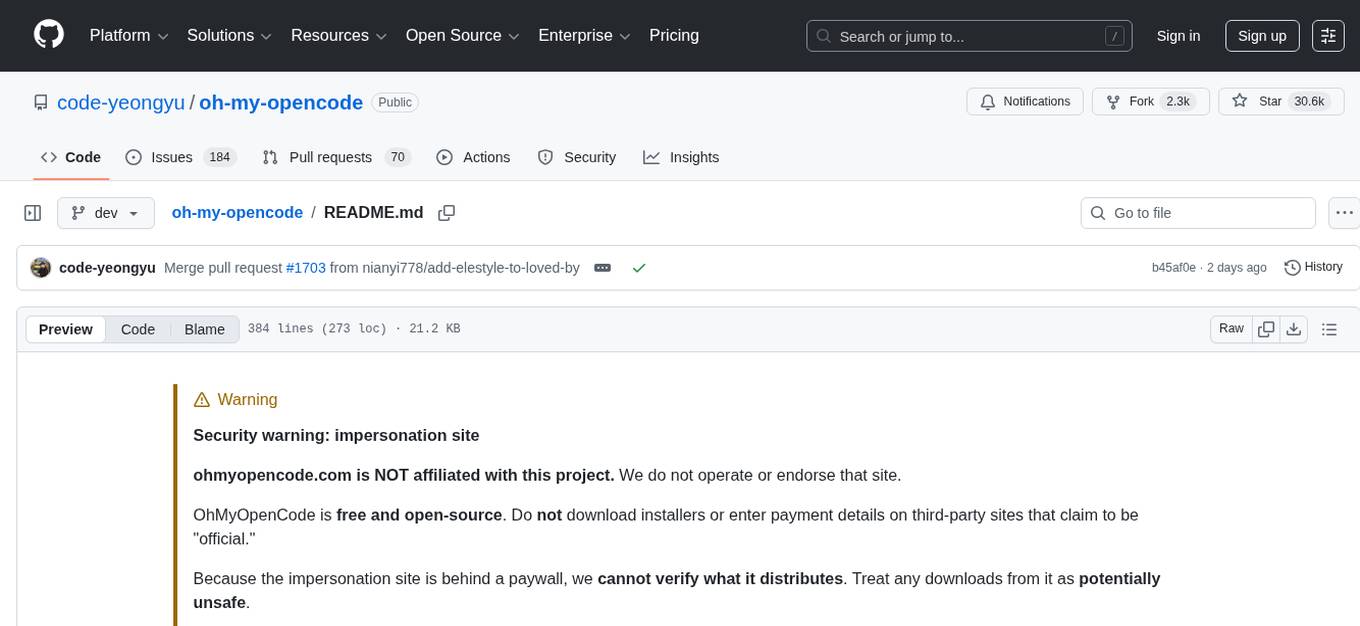
oh-my-opencode
OhMyOpenCode is a free and open-source tool that enhances coding productivity by providing an agent harness for orchestrating multiple models and tools. It offers features like background agents, LSP/AST tools, curated MCPs, and compatibility with various agents like Claude Code. The tool aims to boost productivity, automate tasks, and streamline the coding process for users. It is highly extensible and customizable, catering to both hackers and non-hackers alike, with a focus on enhancing the development experience and performance.
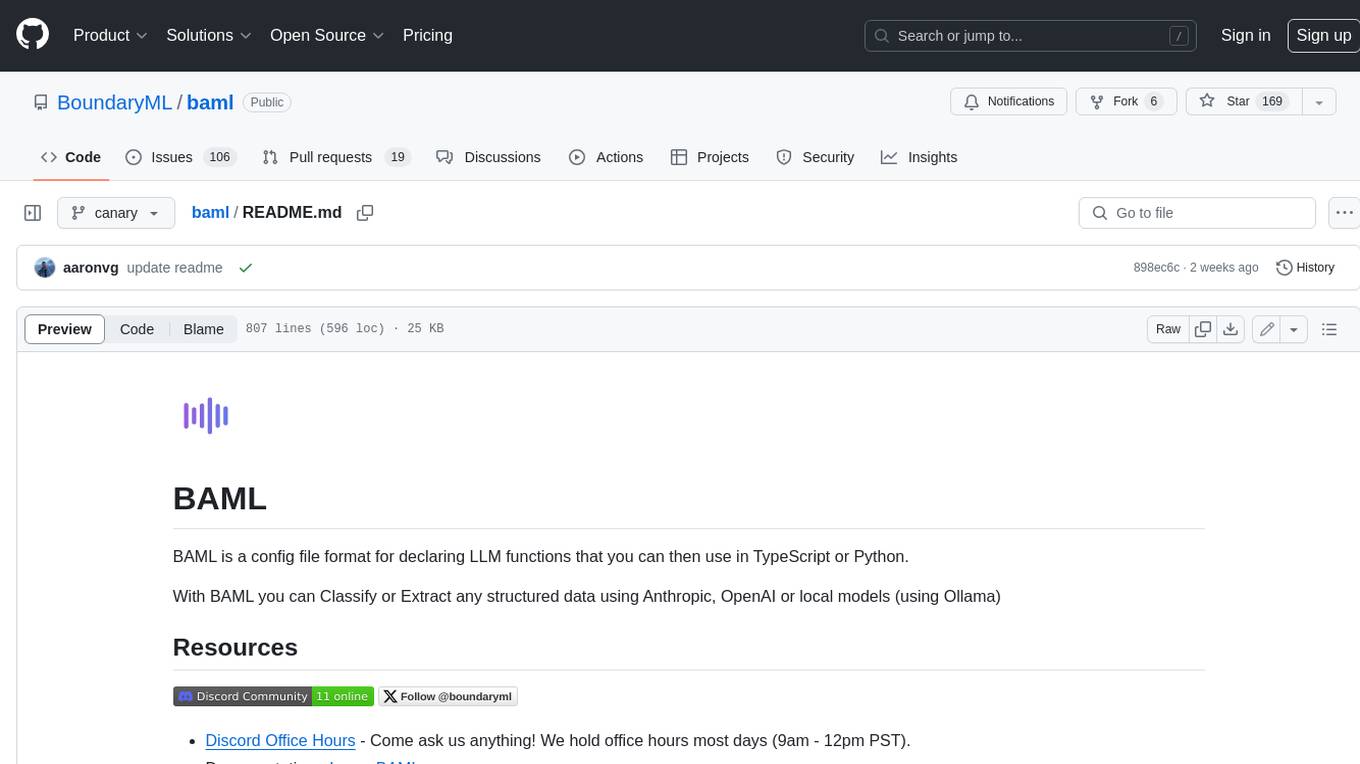
baml
BAML is a config file format for declaring LLM functions that you can then use in TypeScript or Python. With BAML you can Classify or Extract any structured data using Anthropic, OpenAI or local models (using Ollama) ## Resources  [Discord Community](https://discord.gg/boundaryml)  [Follow us on Twitter](https://twitter.com/boundaryml) * Discord Office Hours - Come ask us anything! We hold office hours most days (9am - 12pm PST). * Documentation - Learn BAML * Documentation - BAML Syntax Reference * Documentation - Prompt engineering tips * Boundary Studio - Observability and more #### Starter projects * BAML + NextJS 14 * BAML + FastAPI + Streaming ## Motivation Calling LLMs in your code is frustrating: * your code uses types everywhere: classes, enums, and arrays * but LLMs speak English, not types BAML makes calling LLMs easy by taking a type-first approach that lives fully in your codebase: 1. Define what your LLM output type is in a .baml file, with rich syntax to describe any field (even enum values) 2. Declare your prompt in the .baml config using those types 3. Add additional LLM config like retries or redundancy 4. Transpile the .baml files to a callable Python or TS function with a type-safe interface. (VSCode extension does this for you automatically). We were inspired by similar patterns for type safety: protobuf and OpenAPI for RPCs, Prisma and SQLAlchemy for databases. BAML guarantees type safety for LLMs and comes with tools to give you a great developer experience:  Jump to BAML code or how Flexible Parsing works without additional LLM calls. | BAML Tooling | Capabilities | | ----------------------------------------------------------------------------------------- | ---------------------------------------------------------------------------------------------------------------------------------------------------------------------------------------------------------------------------------------------------------------------------------------------------------------------------------- | | BAML Compiler install | Transpiles BAML code to a native Python / Typescript library (you only need it for development, never for releases) Works on Mac, Windows, Linux  | | VSCode Extension install | Syntax highlighting for BAML files Real-time prompt preview Testing UI | | Boundary Studio open (not open source) | Type-safe observability Labeling |
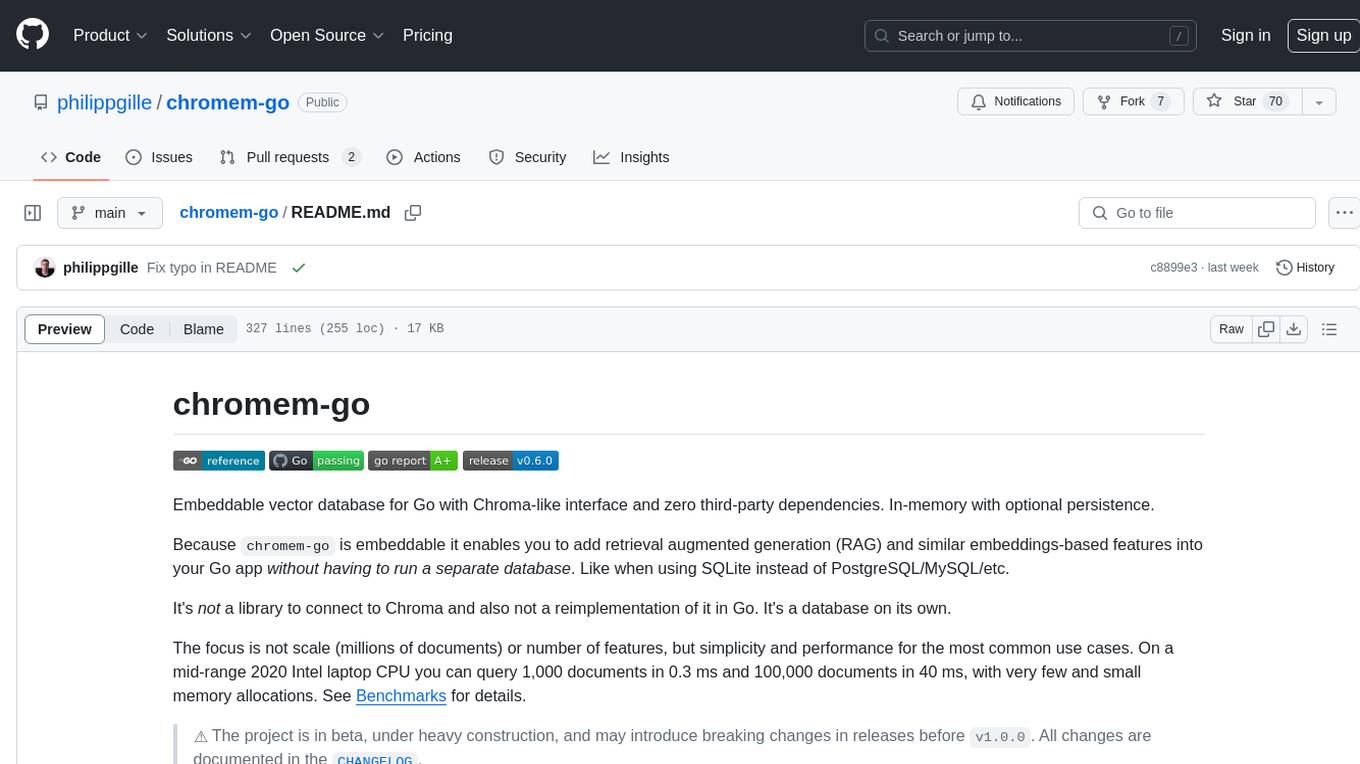
chromem-go
chromem-go is an embeddable vector database for Go with a Chroma-like interface and zero third-party dependencies. It enables retrieval augmented generation (RAG) and similar embeddings-based features in Go apps without the need for a separate database. The focus is on simplicity and performance for common use cases, allowing querying of documents with minimal memory allocations. The project is in beta and may introduce breaking changes before v1.0.0.

LLamaSharp
LLamaSharp is a cross-platform library to run 🦙LLaMA/LLaVA model (and others) on your local device. Based on llama.cpp, inference with LLamaSharp is efficient on both CPU and GPU. With the higher-level APIs and RAG support, it's convenient to deploy LLM (Large Language Model) in your application with LLamaSharp.

Trace
Trace is a new AutoDiff-like tool for training AI systems end-to-end with general feedback. It generalizes the back-propagation algorithm by capturing and propagating an AI system's execution trace. Implemented as a PyTorch-like Python library, users can write Python code directly and use Trace primitives to optimize certain parts, similar to training neural networks.
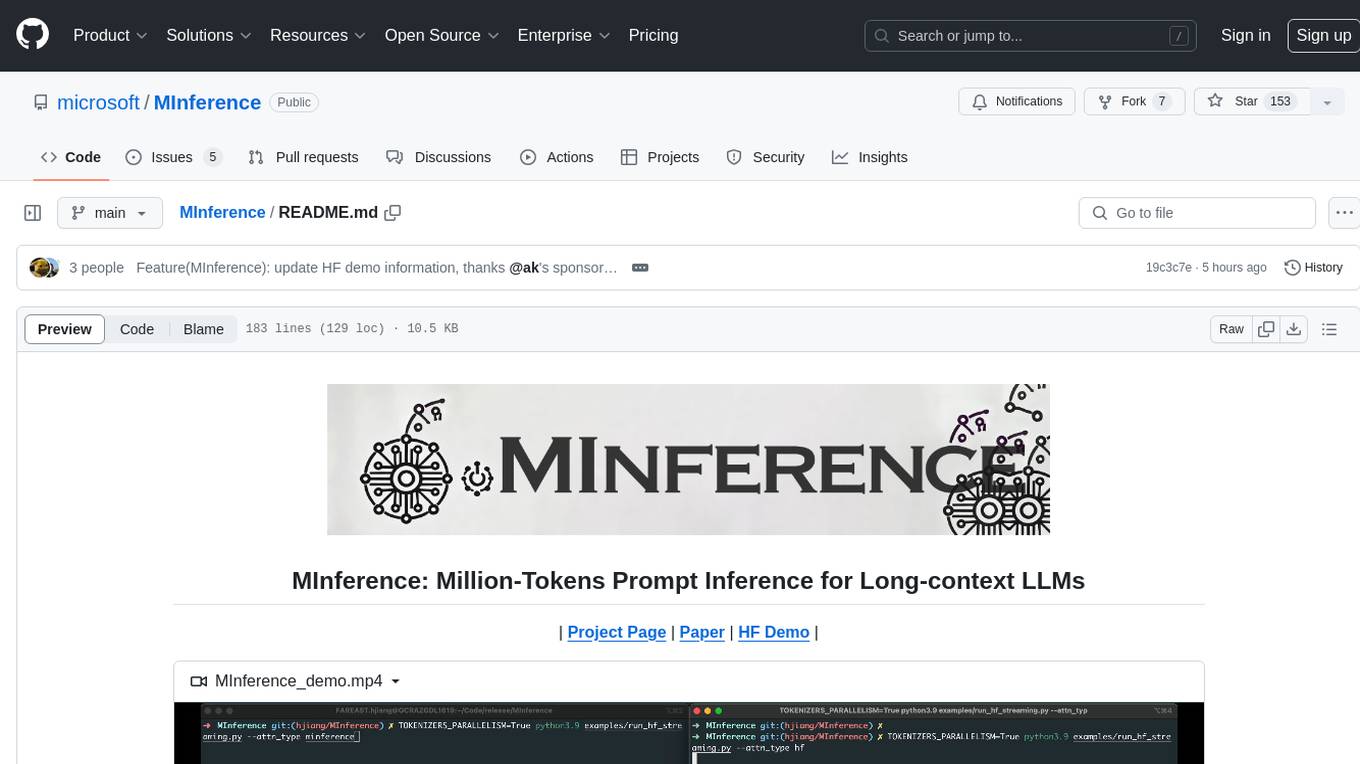
MInference
MInference is a tool designed to accelerate pre-filling for long-context Language Models (LLMs) by leveraging dynamic sparse attention. It achieves up to a 10x speedup for pre-filling on an A100 while maintaining accuracy. The tool supports various decoding LLMs, including LLaMA-style models and Phi models, and provides custom kernels for attention computation. MInference is useful for researchers and developers working with large-scale language models who aim to improve efficiency without compromising accuracy.
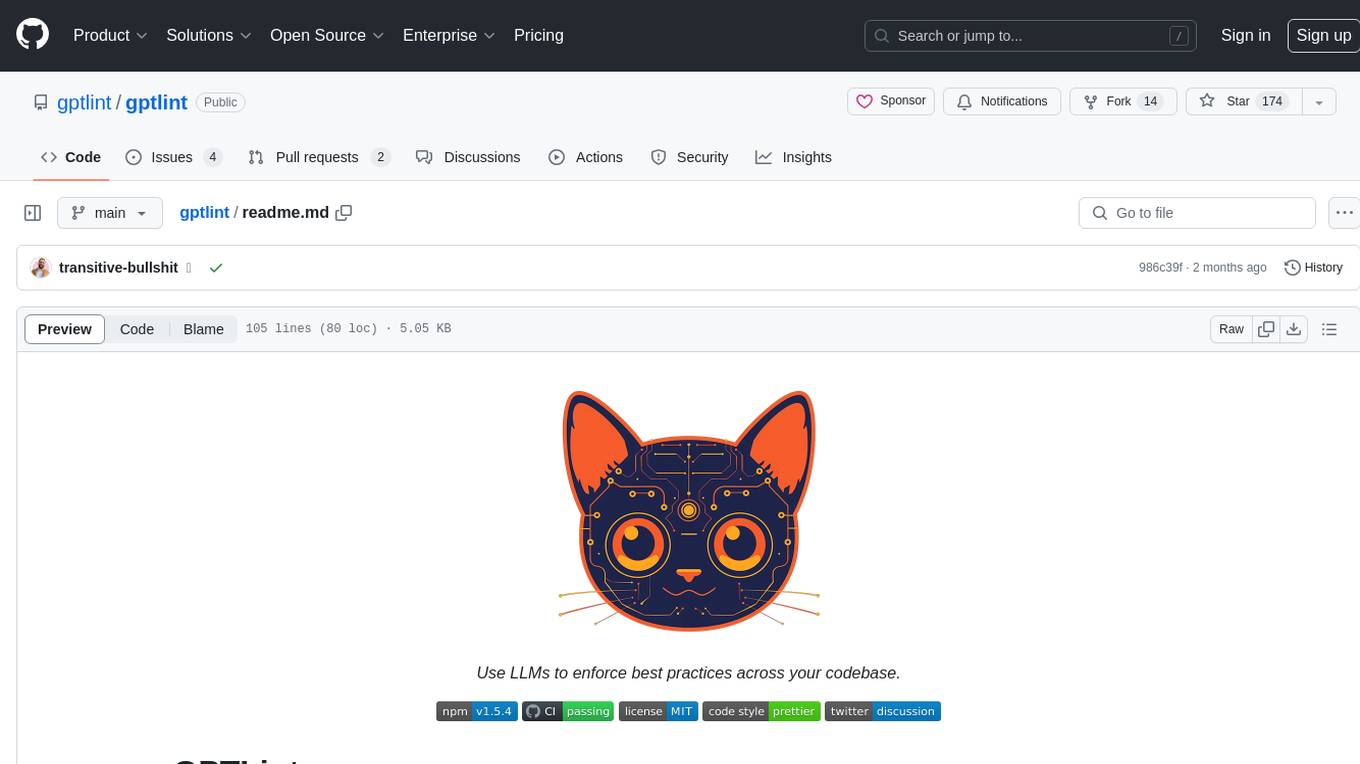
gptlint
GPTLint is a tool that utilizes Large Language Models (LLMs) to enforce higher-level best practices across a codebase. It offers features such as enforcing rules that are impossible with AST-based approaches, simple markdown format for rules, easy customization of rules, support for custom project-specific rules, content-based caching, and outputting LLM stats per run. GPTLint supports all major LLM providers and local models, augments ESLint instead of replacing it, and includes guidelines for creating custom rules. However, the MVP rules are currently limited to JS/TS only, single-file context only, and do not support autofixing.
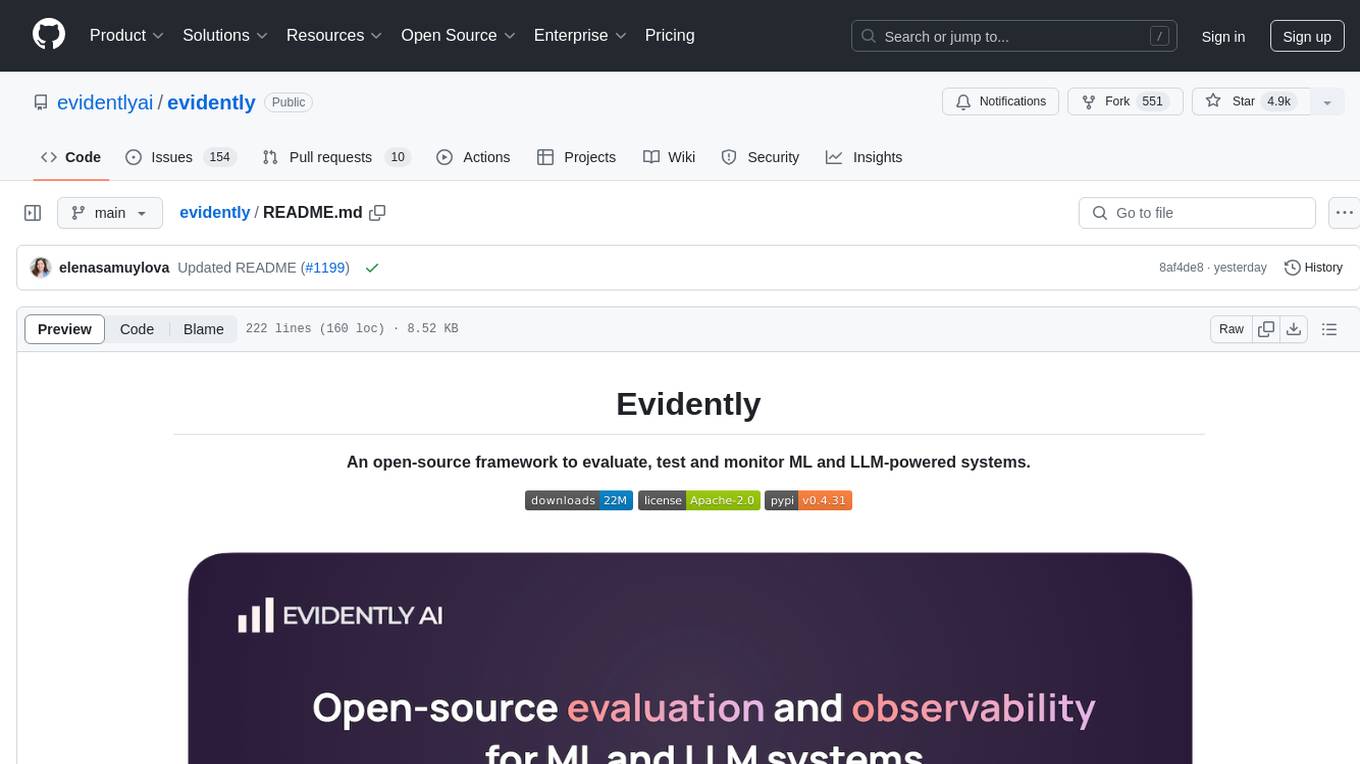
evidently
Evidently is an open-source Python library designed for evaluating, testing, and monitoring machine learning (ML) and large language model (LLM) powered systems. It offers a wide range of functionalities, including working with tabular, text data, and embeddings, supporting predictive and generative systems, providing over 100 built-in metrics for data drift detection and LLM evaluation, allowing for custom metrics and tests, enabling both offline evaluations and live monitoring, and offering an open architecture for easy data export and integration with existing tools. Users can utilize Evidently for one-off evaluations using Reports or Test Suites in Python, or opt for real-time monitoring through the Dashboard service.
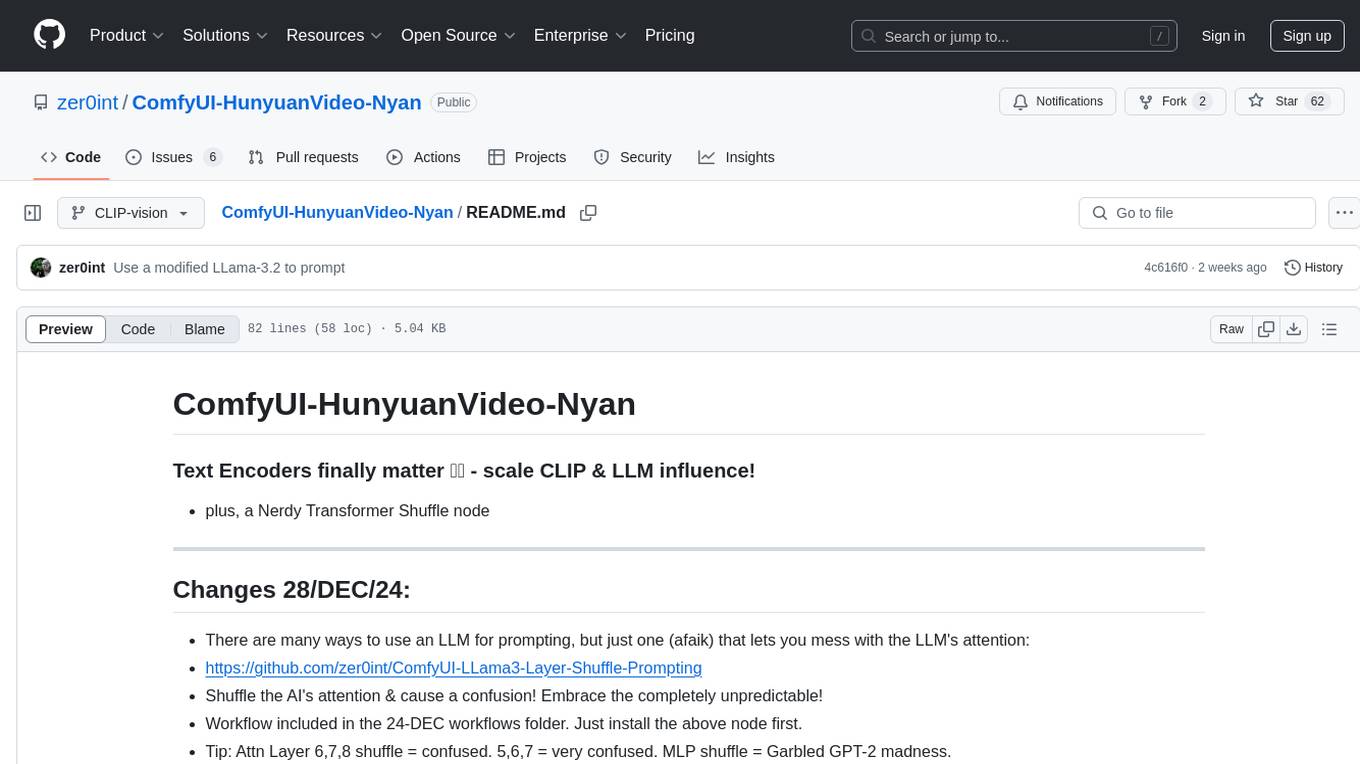
ComfyUI-HunyuanVideo-Nyan
ComfyUI-HunyuanVideo-Nyan is a repository that provides tools for manipulating the attention of LLM models, allowing users to shuffle the AI's attention and cause confusion. The repository includes a Nerdy Transformer Shuffle node that enables users to mess with the LLM's attention layers, providing a workflow for installation and usage. It also offers a new SAE-informed Long-CLIP model with high accuracy, along with recommendations for CLIP models. Users can find detailed instructions on how to use the provided nodes to scale CLIP & LLM factors and create high-quality nature videos. The repository emphasizes compatibility with other related tools and provides insights into the functionality of the included nodes.
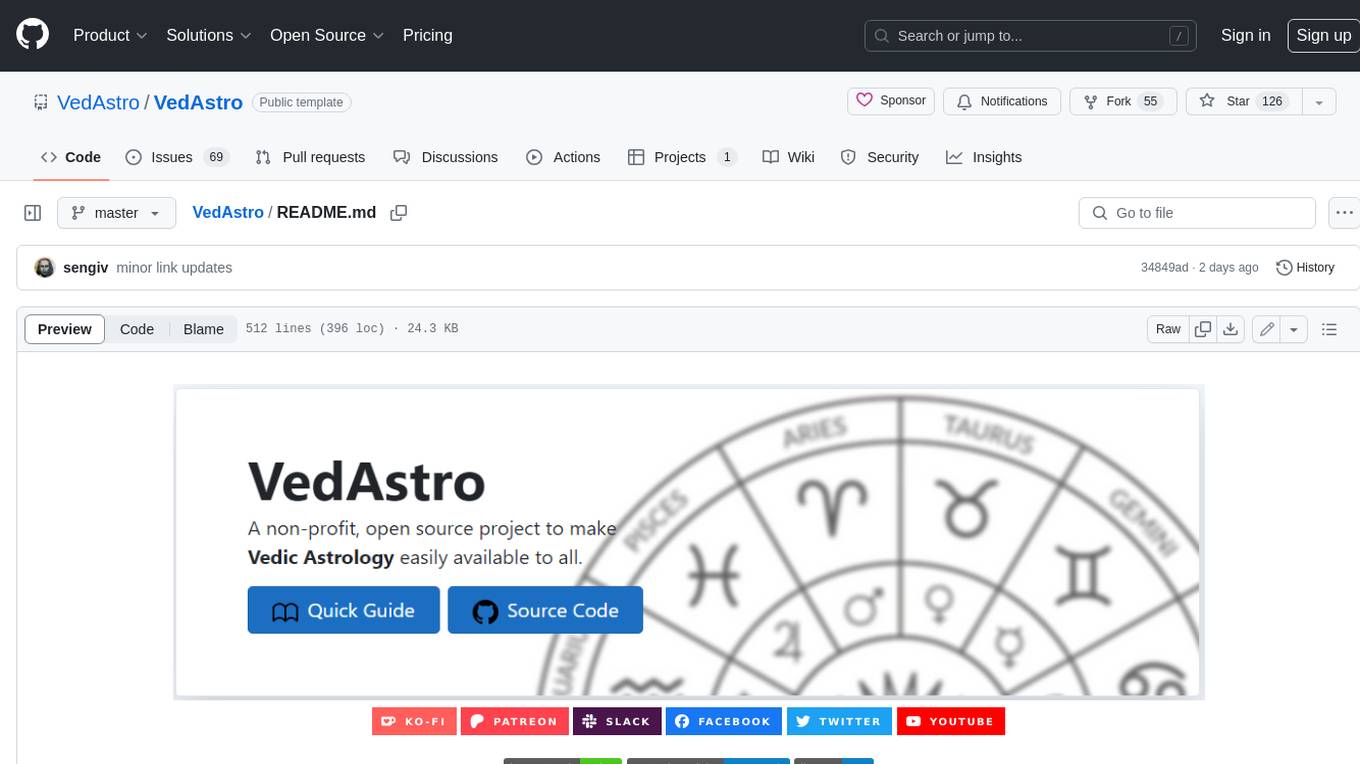
VedAstro
VedAstro is an open-source Vedic astrology tool that provides accurate astrological predictions and data. It offers a user-friendly website, a chat API, an open API, a JavaScript SDK, a Swiss Ephemeris API, and a machine learning table generator. VedAstro is free to use and is constantly being updated with new features and improvements.
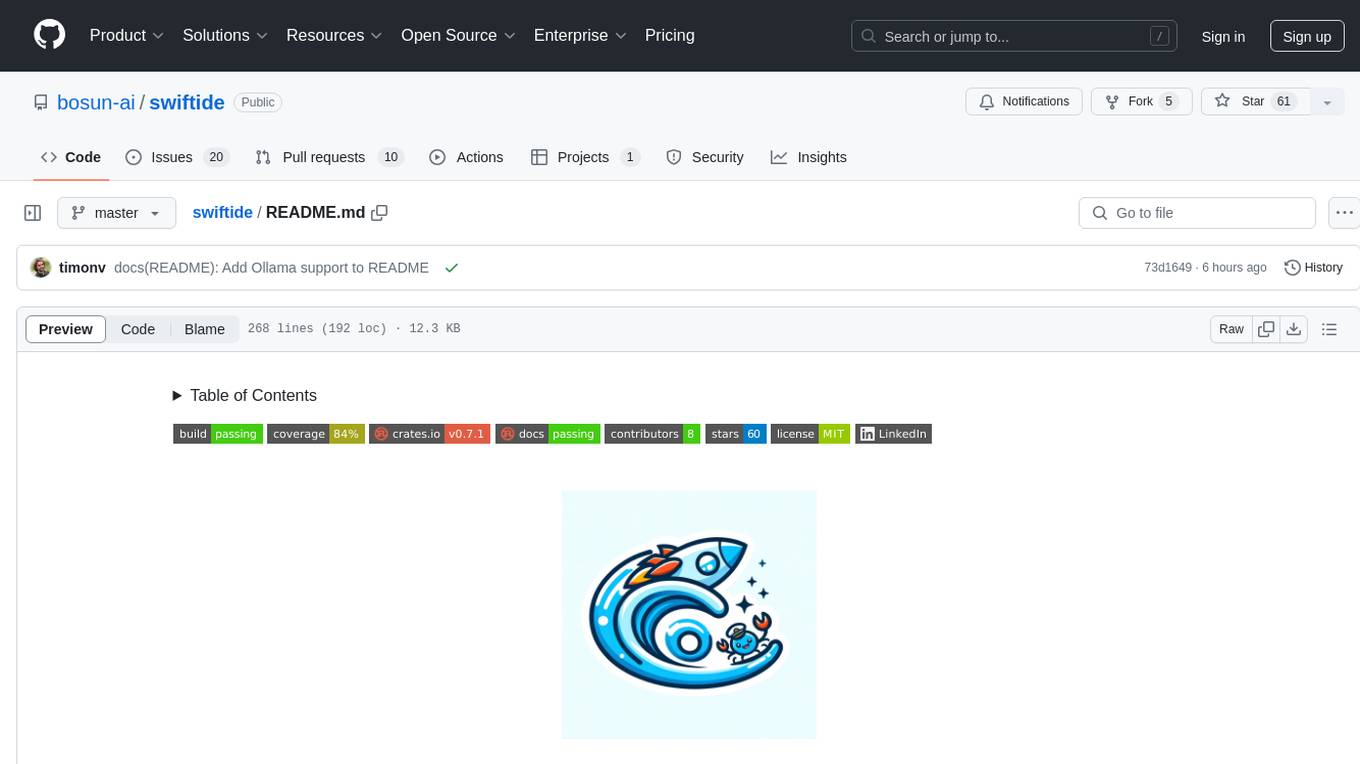
swiftide
Swiftide is a fast, streaming indexing and query library tailored for Retrieval Augmented Generation (RAG) in AI applications. It is built in Rust, utilizing parallel, asynchronous streams for blazingly fast performance. With Swiftide, users can easily build AI applications from idea to production in just a few lines of code. The tool addresses frustrations around performance, stability, and ease of use encountered while working with Python-based tooling. It offers features like fast streaming indexing pipeline, experimental query pipeline, integrations with various platforms, loaders, transformers, chunkers, embedders, and more. Swiftide aims to provide a platform for data indexing and querying to advance the development of automated Large Language Model (LLM) applications.
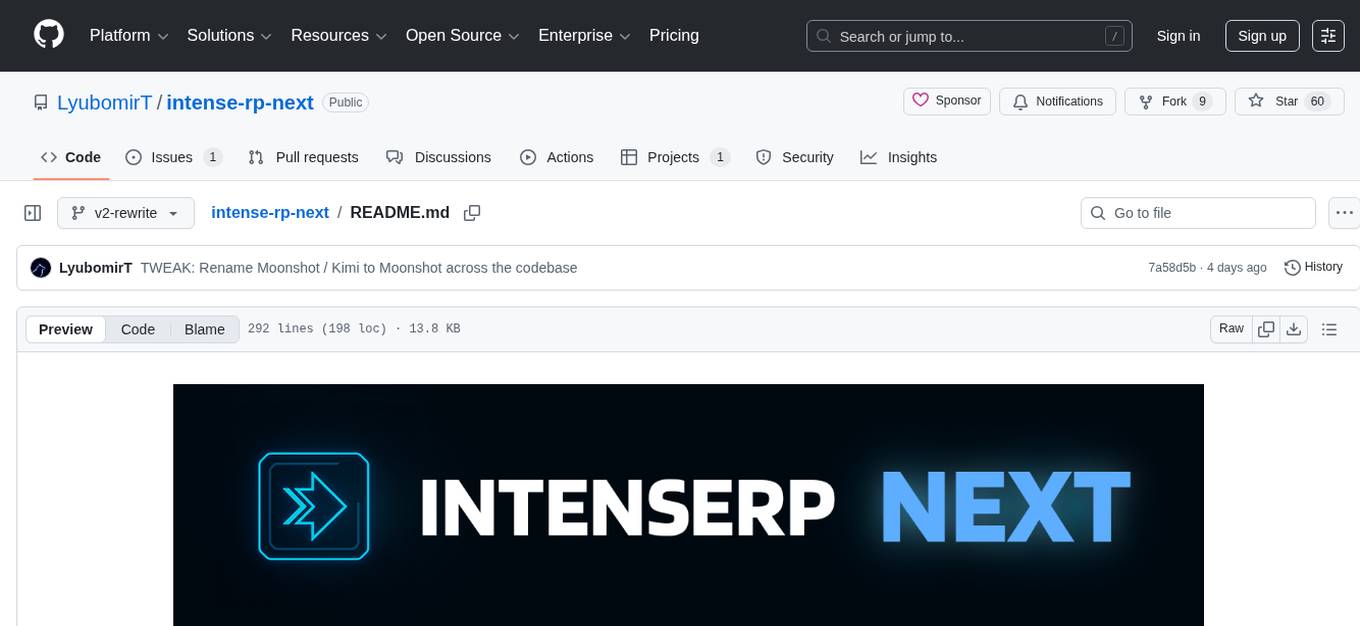
intense-rp-next
IntenseRP Next v2 is a local OpenAI-compatible API + desktop app that bridges an OpenAI-style client (like SillyTavern) with provider web apps (DeepSeek, GLM Chat, Moonshot) by starting a local FastAPI server, launching a real Chromium session, intercepting streaming network responses, and re-emitting them as OpenAI-style SSE deltas for the client. It provides free-ish access to provider web models via the official web apps, a clicky desktop app experience, and occasional wait times due to web app changes. The tool is designed for local or LAN use and comes with built-in logging, update flows, and support for DeepSeek, GLM Chat, and Moonshot provider apps.
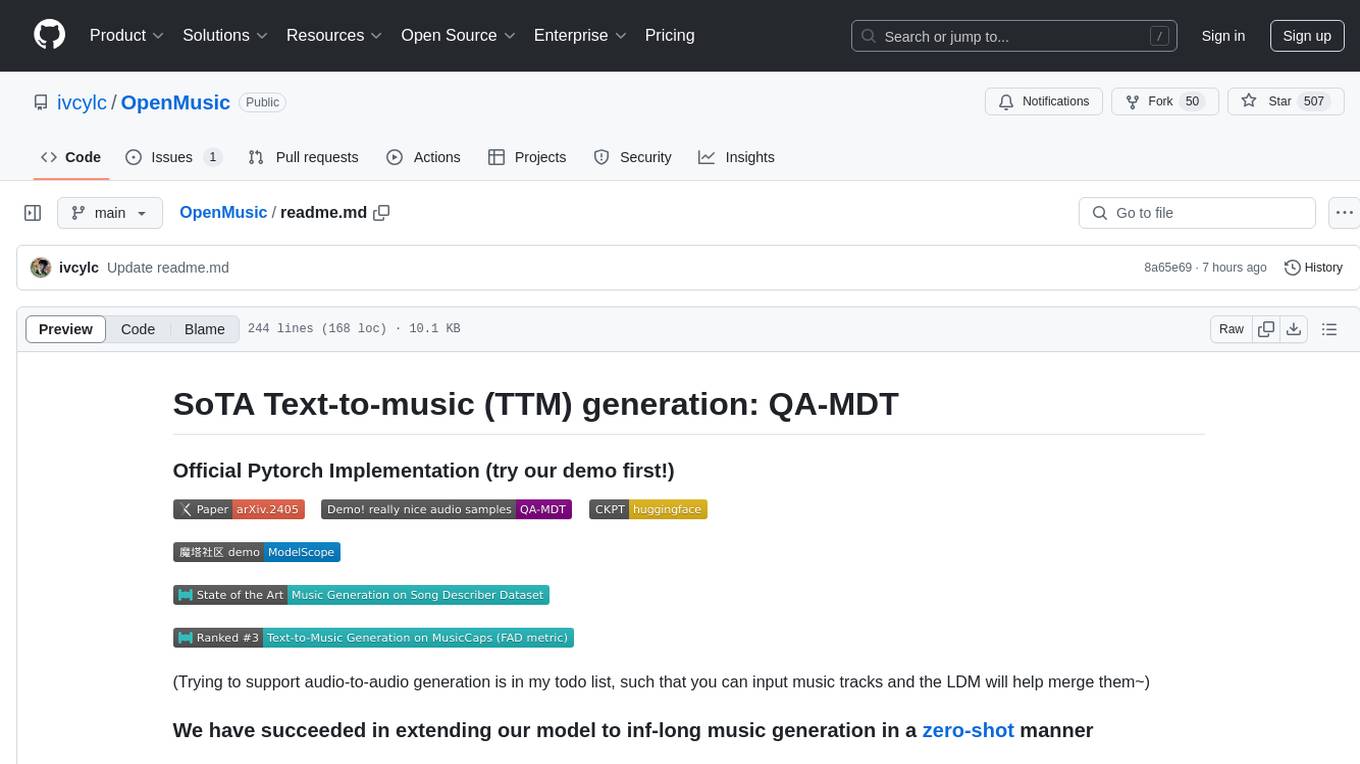
OpenMusic
OpenMusic is a repository providing an implementation of QA-MDT, a Quality-Aware Masked Diffusion Transformer for music generation. The code integrates state-of-the-art models and offers training strategies for music generation. The repository includes implementations of AudioLDM, PixArt-alpha, MDT, AudioMAE, and Open-Sora. Users can train or fine-tune the model using different strategies and datasets. The model is well-pretrained and can be used for music generation tasks. The repository also includes instructions for preparing datasets, training the model, and performing inference. Contact information is provided for any questions or suggestions regarding the project.
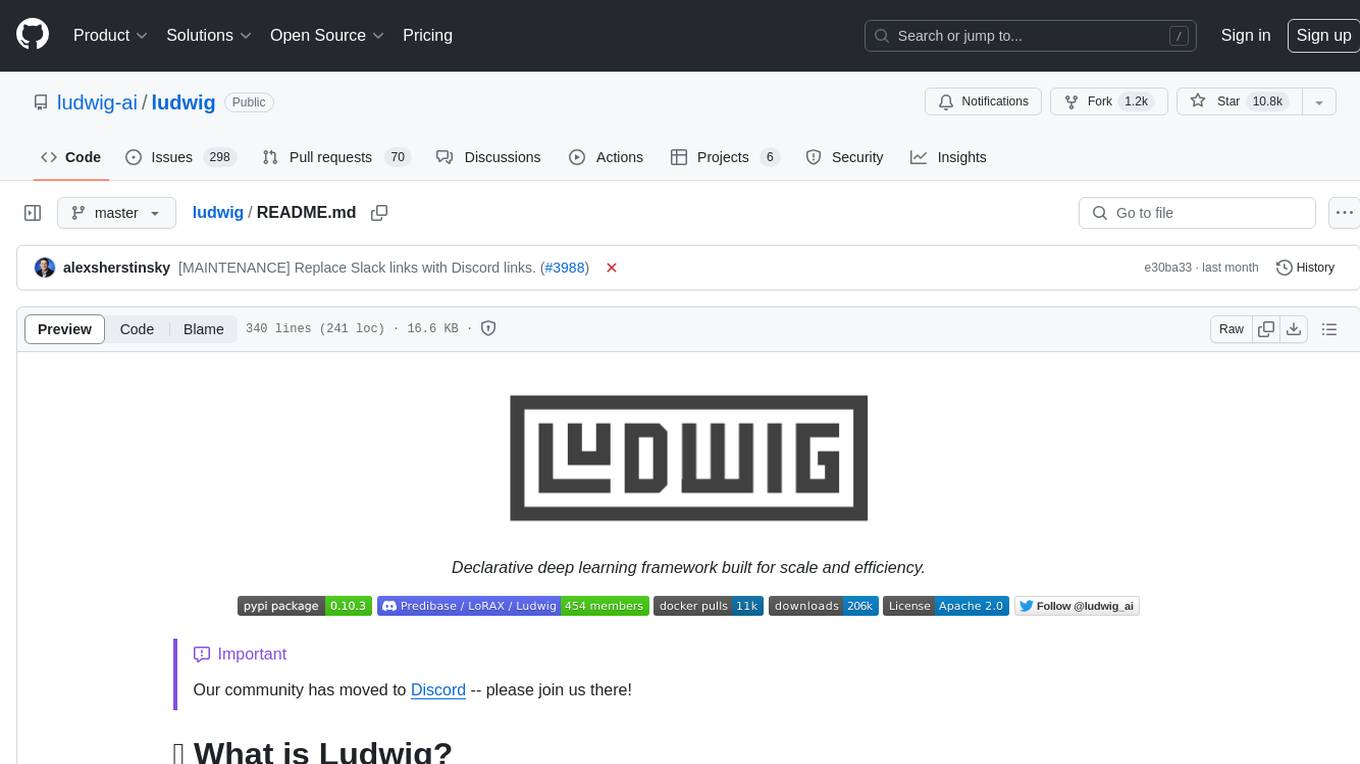
ludwig
Ludwig is a declarative deep learning framework designed for scale and efficiency. It is a low-code framework that allows users to build custom AI models like LLMs and other deep neural networks with ease. Ludwig offers features such as optimized scale and efficiency, expert level control, modularity, and extensibility. It is engineered for production with prebuilt Docker containers, support for running with Ray on Kubernetes, and the ability to export models to Torchscript and Triton. Ludwig is hosted by the Linux Foundation AI & Data.

weave
Weave is a toolkit for developing Generative AI applications, built by Weights & Biases. With Weave, you can log and debug language model inputs, outputs, and traces; build rigorous, apples-to-apples evaluations for language model use cases; and organize all the information generated across the LLM workflow, from experimentation to evaluations to production. Weave aims to bring rigor, best-practices, and composability to the inherently experimental process of developing Generative AI software, without introducing cognitive overhead.
For similar tasks

ai-tech-interview
This repository contains a collection of interview questions related to various topics such as statistics, machine learning, deep learning, Python, networking, operating systems, data structures, and algorithms. The questions cover a wide range of concepts and are suitable for individuals preparing for technical interviews in the field of artificial intelligence and data science.
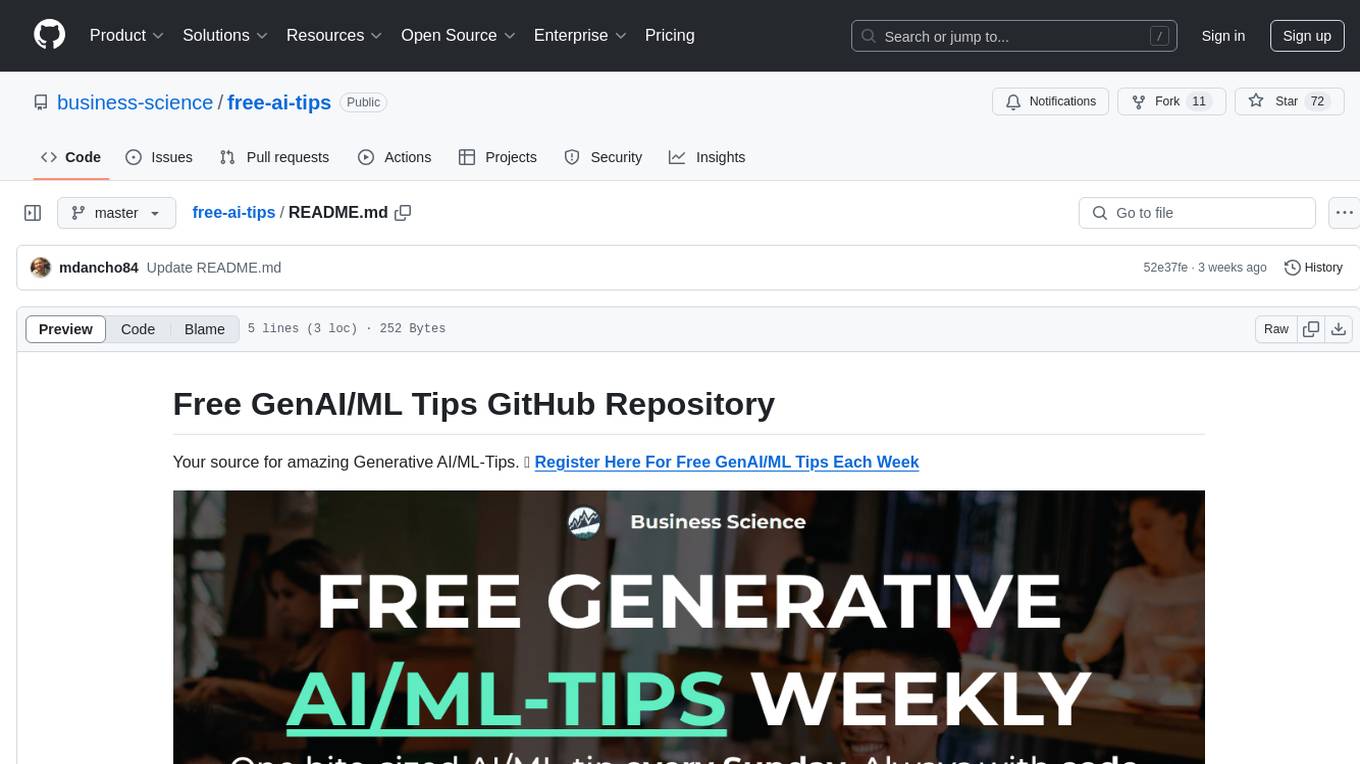
free-ai-tips
Free AI Tips is a GitHub repository that provides weekly tips on Generative AI and Machine Learning. Users can register to receive these tips for free. The repository aims to offer valuable insights and knowledge in the field of AI and ML to help individuals enhance their skills and stay updated with the latest trends and developments.
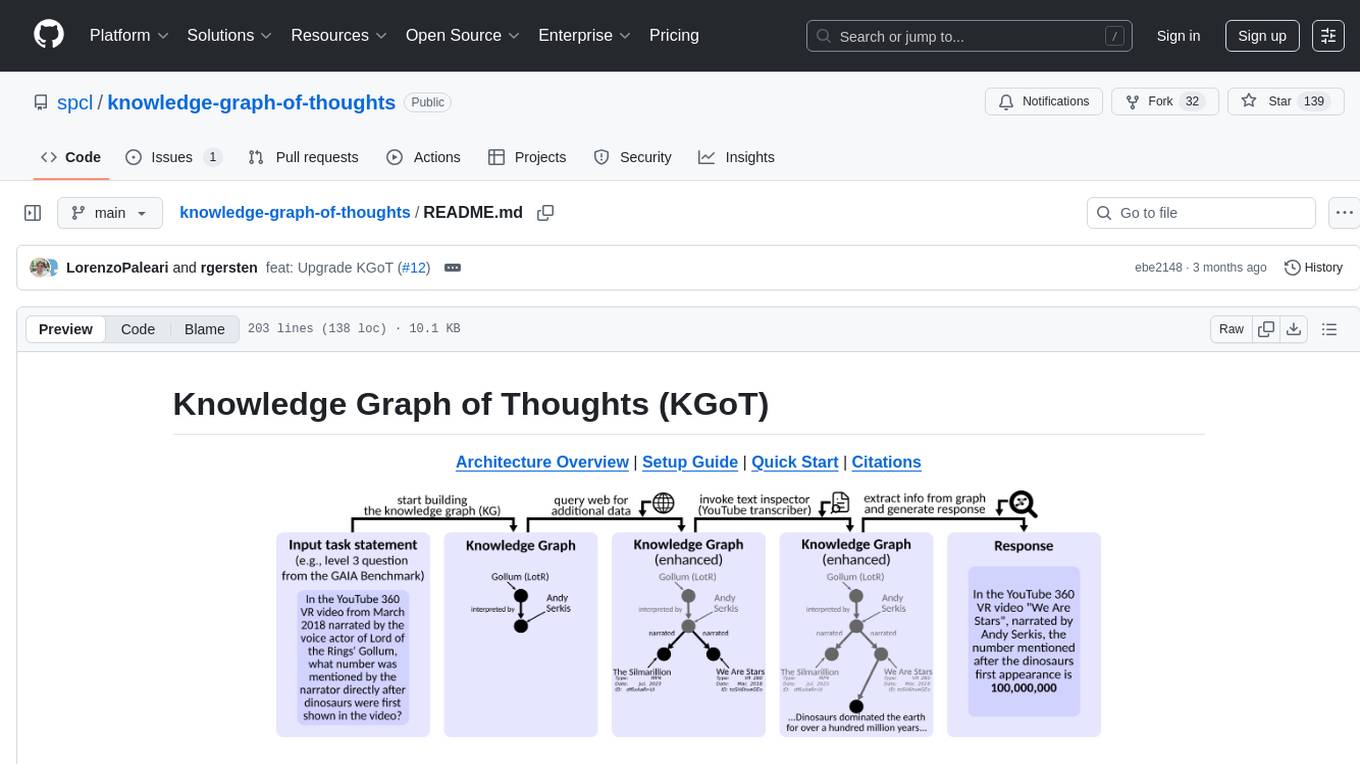
knowledge-graph-of-thoughts
Knowledge Graph of Thoughts (KGoT) is an innovative AI assistant architecture that integrates LLM reasoning with dynamically constructed knowledge graphs (KGs). KGoT extracts and structures task-relevant knowledge into a dynamic KG representation, iteratively enhanced through external tools such as math solvers, web crawlers, and Python scripts. Such structured representation of task-relevant knowledge enables low-cost models to solve complex tasks effectively. The KGoT system consists of three main components: the Controller, the Graph Store, and the Integrated Tools, each playing a critical role in the task-solving process.

Awesome-CS-Books
Awesome CS Books is a curated list of books on computer science and technology. The books are organized by topic, including programming languages, software engineering, computer networks, operating systems, databases, data structures and algorithms, big data, architecture, and interviews. The books are available in PDF format and can be downloaded for free. The repository also includes links to free online courses and other resources.

Awesome-Books-Notes
Awesome CS Books is a repository that archives excellent books related to computer science and technology, named in the format of {year}-{author}-{title}-{version}. It includes reading notes for each book, with PDF links provided at the beginning of the notes. The repository focuses on IT CS-related books, valuable open courses, and aims to provide a systematic way of learning to alleviate fragmented skills and one-sidedness. It respects the original authors by linking to official/copyright websites and emphasizes non-commercial use of the documents.
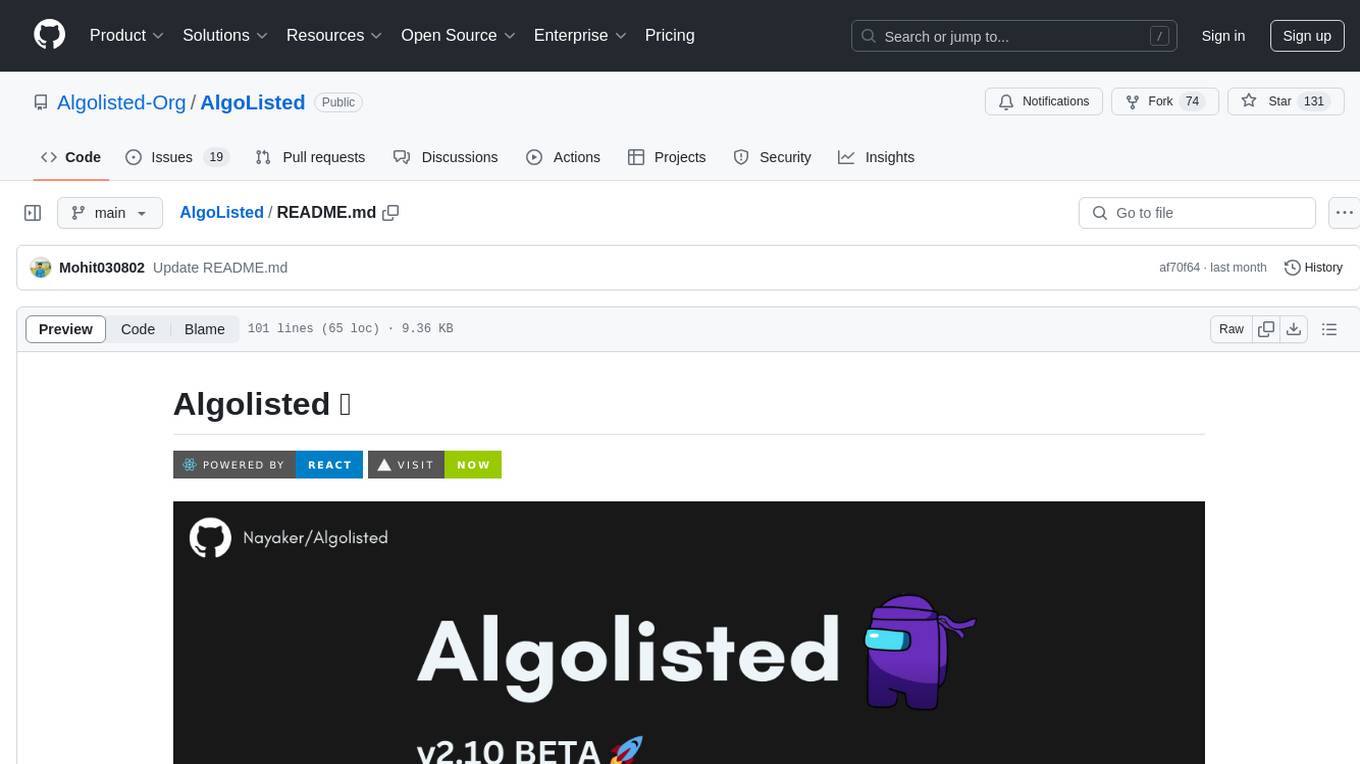
AlgoListed
Algolisted is a pioneering platform dedicated to algorithmic problem-solving, offering a centralized hub for a diverse array of algorithmic challenges. It provides an immersive online environment for programmers to enhance their skills through Data Structures and Algorithms (DSA) sheets, academic progress tracking, resume refinement with OpenAI integration, adaptive testing, and job opportunity listings. The project is built on the MERN stack, Flask, Beautiful Soup, and Selenium,GEN AI, and deployed on Firebase. Algolisted aims to be a reliable companion in the pursuit of coding knowledge and proficiency.
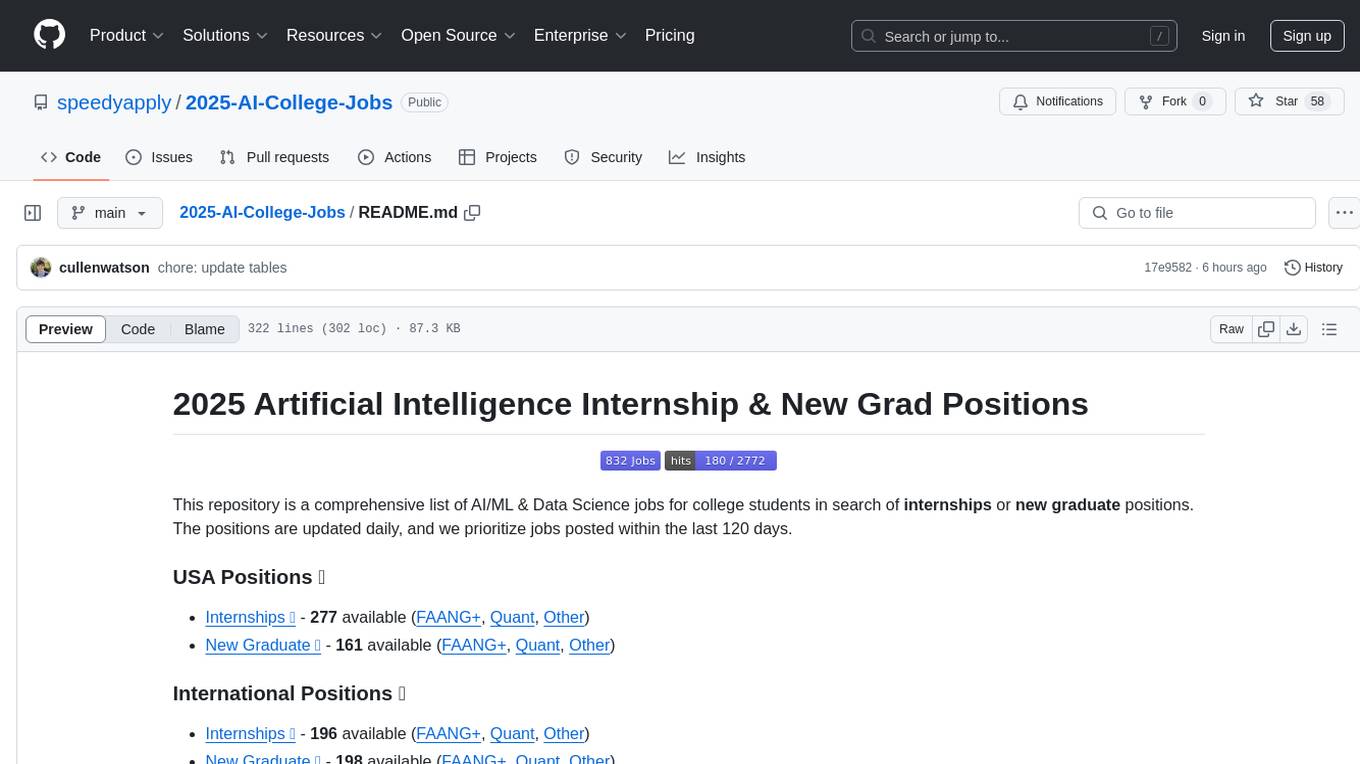
2025-AI-College-Jobs
2025-AI-College-Jobs is a repository containing a comprehensive list of AI/ML & Data Science jobs suitable for college students seeking internships or new graduate positions. The repository is regularly updated with positions posted within the last 120 days, featuring opportunities from various companies in the USA and internationally. The list includes positions in areas such as research scientist internships, quantitative research analyst roles, and other data science-related positions. The repository aims to provide a valuable resource for students looking to kickstart their careers in the field of artificial intelligence and machine learning.

Awesome-RoadMaps-and-Interviews
Awesome RoadMaps and Interviews is a comprehensive repository that aims to provide guidance for technical interviews and career development in the ITCS field. It covers a wide range of topics including interview strategies, technical knowledge, and practical insights gained from years of interviewing experience. The repository emphasizes the importance of combining theoretical knowledge with practical application, and encourages users to expand their interview preparation beyond just algorithms. It also offers resources for enhancing knowledge breadth, depth, and programming skills through curated roadmaps, mind maps, cheat sheets, and coding snippets. The content is structured to help individuals navigate various technical roles and technologies, fostering continuous learning and professional growth.
For similar jobs

weave
Weave is a toolkit for developing Generative AI applications, built by Weights & Biases. With Weave, you can log and debug language model inputs, outputs, and traces; build rigorous, apples-to-apples evaluations for language model use cases; and organize all the information generated across the LLM workflow, from experimentation to evaluations to production. Weave aims to bring rigor, best-practices, and composability to the inherently experimental process of developing Generative AI software, without introducing cognitive overhead.

LLMStack
LLMStack is a no-code platform for building generative AI agents, workflows, and chatbots. It allows users to connect their own data, internal tools, and GPT-powered models without any coding experience. LLMStack can be deployed to the cloud or on-premise and can be accessed via HTTP API or triggered from Slack or Discord.

VisionCraft
The VisionCraft API is a free API for using over 100 different AI models. From images to sound.

kaito
Kaito is an operator that automates the AI/ML inference model deployment in a Kubernetes cluster. It manages large model files using container images, avoids tuning deployment parameters to fit GPU hardware by providing preset configurations, auto-provisions GPU nodes based on model requirements, and hosts large model images in the public Microsoft Container Registry (MCR) if the license allows. Using Kaito, the workflow of onboarding large AI inference models in Kubernetes is largely simplified.

PyRIT
PyRIT is an open access automation framework designed to empower security professionals and ML engineers to red team foundation models and their applications. It automates AI Red Teaming tasks to allow operators to focus on more complicated and time-consuming tasks and can also identify security harms such as misuse (e.g., malware generation, jailbreaking), and privacy harms (e.g., identity theft). The goal is to allow researchers to have a baseline of how well their model and entire inference pipeline is doing against different harm categories and to be able to compare that baseline to future iterations of their model. This allows them to have empirical data on how well their model is doing today, and detect any degradation of performance based on future improvements.

tabby
Tabby is a self-hosted AI coding assistant, offering an open-source and on-premises alternative to GitHub Copilot. It boasts several key features: * Self-contained, with no need for a DBMS or cloud service. * OpenAPI interface, easy to integrate with existing infrastructure (e.g Cloud IDE). * Supports consumer-grade GPUs.

spear
SPEAR (Simulator for Photorealistic Embodied AI Research) is a powerful tool for training embodied agents. It features 300 unique virtual indoor environments with 2,566 unique rooms and 17,234 unique objects that can be manipulated individually. Each environment is designed by a professional artist and features detailed geometry, photorealistic materials, and a unique floor plan and object layout. SPEAR is implemented as Unreal Engine assets and provides an OpenAI Gym interface for interacting with the environments via Python.

Magick
Magick is a groundbreaking visual AIDE (Artificial Intelligence Development Environment) for no-code data pipelines and multimodal agents. Magick can connect to other services and comes with nodes and templates well-suited for intelligent agents, chatbots, complex reasoning systems and realistic characters.




